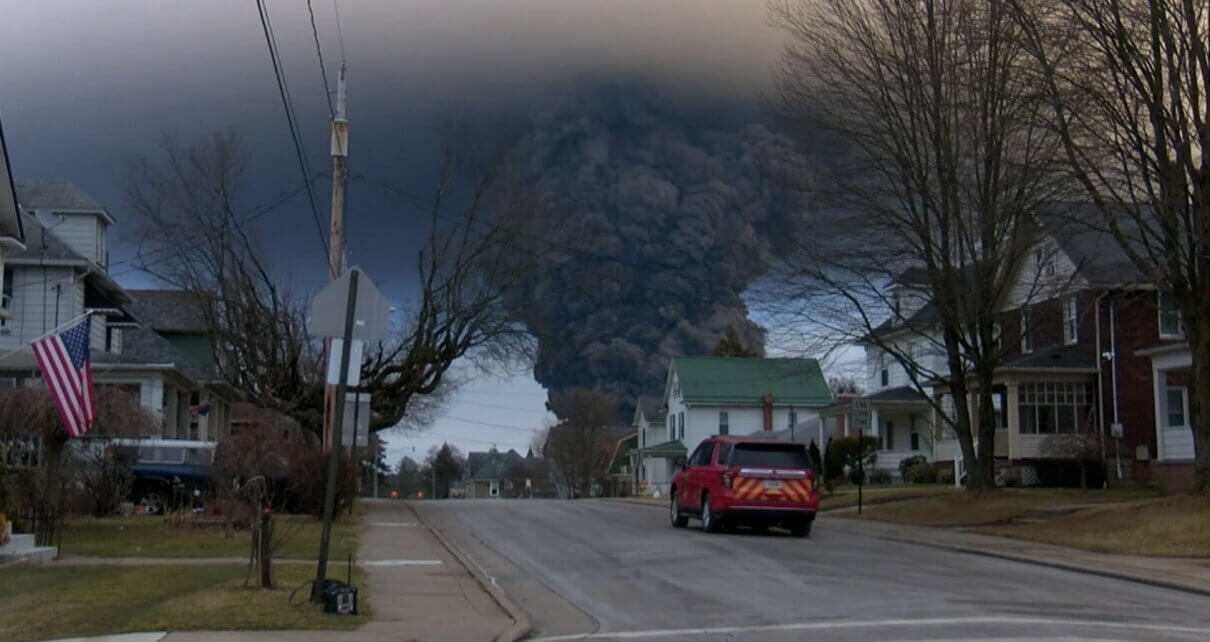On Friday, Feb. 3, a Norfolk Southern freight train carrying hazardous materials derailed in East Palestine, Ohio and caused a large explosion, creating a fire that burned for two days.
As reported by the Environmental Protection Agency (EPA), the train contained 150 cars, 20 of which were listed as carrying hazardous materials. Of the 38 derailed cars, 11 of them were tank cars that dumped 100 thousand gallons of hazardous materials, including vinyl chloride, benzene residue, and butyl acrylate.
According to the National Transportation Safety Board (NTSB)’s report, five of the derailed train cars carried more than 115 thousand gallons of vinyl chloride. The Centers for Disease Control and Prevention (CDC) reports that exposure to high levels of vinyl chloride is known to increase cancer risk and can even cause death.
Marie Mauro, a junior marine and environmental biology and policy student, stated, “The Ohio train spill is more dangerous than what we are being told. Vinyl chloride is a very volatile chemical that can cause adverse health effects that may not be experienced right away. There are obvious environmental issues that are occurring because of the spill and the burning of vinyl chloride.”
Adverse effects were evident immediately following the derailment. The Ohio Department of Natural Resources recorded that within a five mile radius of the crash site, an estimated 3,500 animals died as a result of the derailment. Mary Mertz, who directs the Ohio Department of Natural Resources (ODNR), said in a news conference on Thursday that all of the 43,700 animals found dead in the weeks after the crash were aquatic species.
Although the EPA was speedy in its assurance that the municipal water and air in the surrounding area were safe, some experts have warned that impacts could be enduring if and when the chemicals seep into the soil and groundwater.
Many residents of East Palestine fear the severe health consequences caused by the leaked noxious chemicals like carcinogenic vinyl chloride, which has compromised the local air, soil, and water. In the weeks following the disaster, several residents reported suffering symptoms including headache, nausea, cough, a burning sensation in the throat and nose, and panic attacks. Local residents were ordered to evacuate the area following the derailment and were not allowed to return to their homes until Wednesday, Feb. 8.
Residents have expressed frustration with Norfolk Southern, as well as the U.S. government, for failing to offer clear guidance and transparency on the matter. East Palestine resident Ron Caratelli, who lives less than a mile from the toxic spill site, told The Guardian, “What is this doing to me and others long-term, nobody really has answers. Is it even safe to plant a garden this year?”
As a response to the communities’ frustrations, Alan Shaw, CEO of Norfolk Southern, said, also for The Guardian, that he is “terribly sorry” for the derailment in East Palestine and the company is offering $1,000 per person to any resident living in East Palestine.
Additionally, during a press conference, EPA Administrator Michael Regan told reporters, “Norfolk Southern will pay for cleaning up the mess they created and for the trauma they’ve inflicted on this community.”
The exact cause for the Ohio train derailment has not yet been determined, as the full NTSB investigation is expected to take 12 to 18 months. At a news conference in Washington D.C., NTSB chair Jennifer Homendy said that the crash was “100 percent preventable.”
“We call things accidents,” she said. “There is no accident. Every single event we investigate is preventable.”
The NTSB report noted that the agency will focus on the designs of tank cars and railcars along with maintenance procedures and practices. With this in mind, determining what caused the wheel bearing failure will be key to the investigation.
Einat Shayer, a junior marine and environmental biology and policy student, shared her opinion on the matter: “More research should have been done on proper removal because now there is an issue regarding public health from air pollution and lack of clean water.”
The consequences of the derailment have already presented themselves in other states throughout the country. The fallout has hit Pennsylvania as the Pittsburgh area is part of the Ohio River watershed.
Additionally, around two million gallons of firefighting water from the train derailment site are expected to be disposed of in Harris County, Texas, according to the county’s chief executive.
The Biden administration has come under scrutiny by Republicans for its response to the Norfolk Southern train derailment. Specifically, attacks have been made towards Transportation Secretary Pete Buttigieg for his delayed response on the matter.
According to the press release, Republicans on the Oversight and Accountability Committee are concerned with how long it took for Buttigieg to respond to the derailment. Buttigieg has since visited East Palestine, and while there, responded to criticism that he should have come to East Palestine sooner. He told local news broadcaster WKBN that he held off in the initial stages to let investigators do their work.



